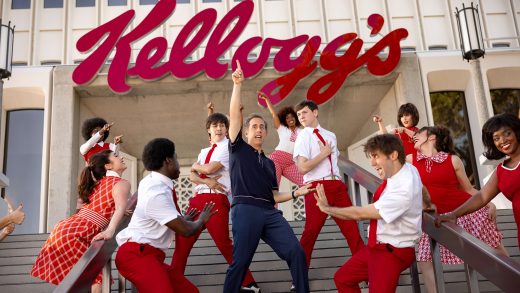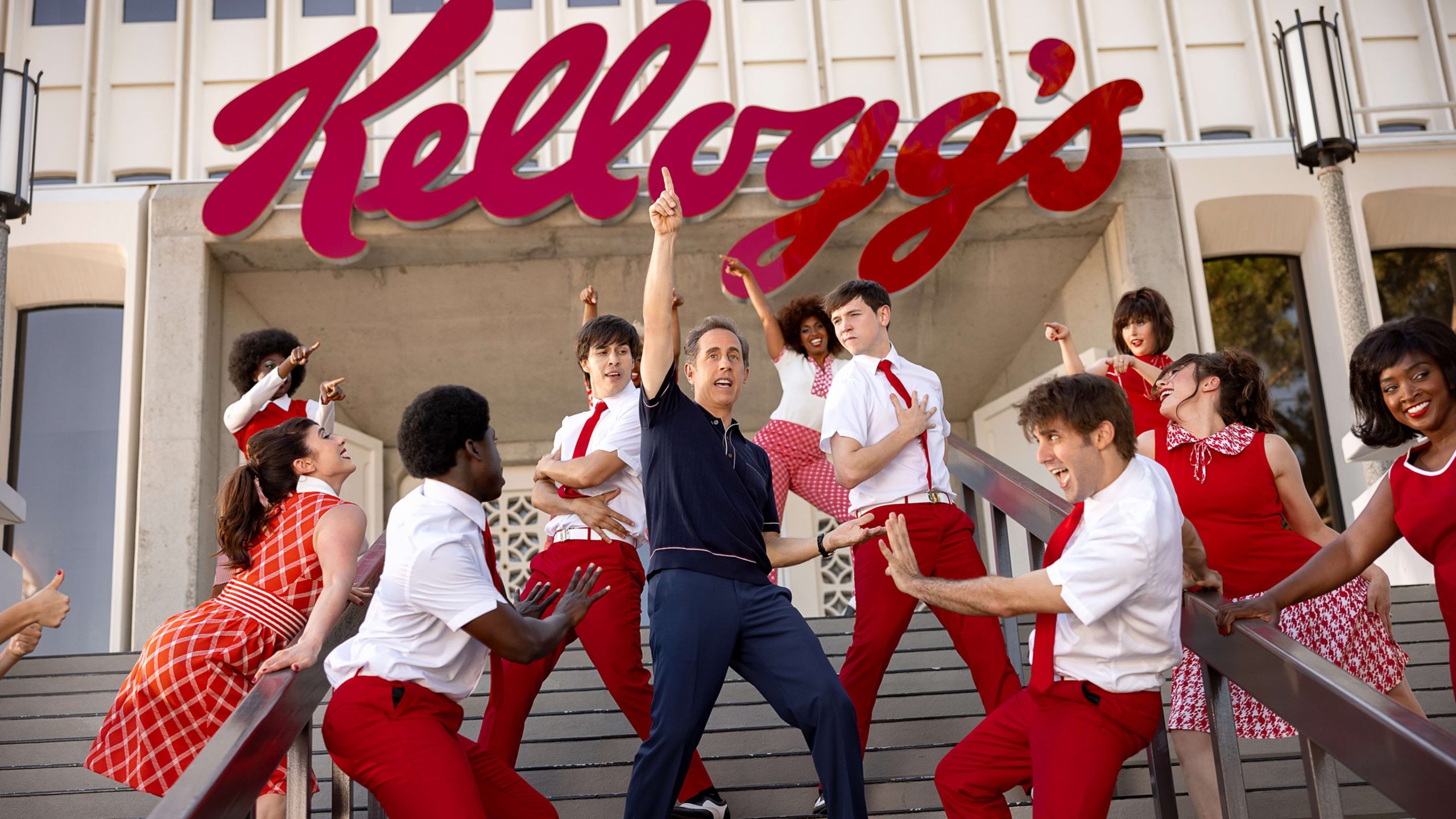‘Unfrosted’ is the latest in corporate nostalgia, Hollywood’s favorite new genre
‘Unfrosted’ is the latest in corporate nostalgia, Hollywood’s favorite new genre
Jerry Seinfeld’s Netflix film follows a cycle of movies that look to the business world as a source of near-religious inspiration.
BY A.S. Hamrah
Jerry Seinfeld’s movie Unfrosted, which the comedy superstar cowrote, directed, and stars in, is an unauthorized, fictionalized account of the creation in 1963 of Kellogg’s Pop-Tarts, the breakfast product officially described as “toaster pastries.” The film was produced by Netflix and debuted on the streaming platform last week to mixed reviews. A business satire, Unfrosted has a certain energy and attitude in common with the films Jerry Lewis made in the early 1960s, or the ones Frank Tashlin made in the late 1950s.
Seinfeld has cast himself in the kind of role Tony Randall played in Will Success Spoil Rock Hunter?, a harried junior executive at Kellogg’s looking for the next big thing. In this case, the next big thing is a handheld fruit-filled slab that will come in pairs, wrapped in silver foil, and will “split the atom of breakfast”—a real game changer. These first Pop-Tarts, of course, were unfrosted. The title is one of the movie’s many winks. We are expected to know that later in the toaster pastry game, after Pop-Tarts became a big success, Kellogg’s introduced a frosted variety.
The America of Unfrosted exists adjacent to the early 1960s world of Mad Men, so John Hamm and John Slattery have a cameo together in Unfrosted, reprising their hardboiled roles from the TV series to pitch Kellogg’s an inappropriately sexy ad campaign. The joke is that Pop-Tarts is aimed at kids, not cigarette smokers and scotch drinkers.
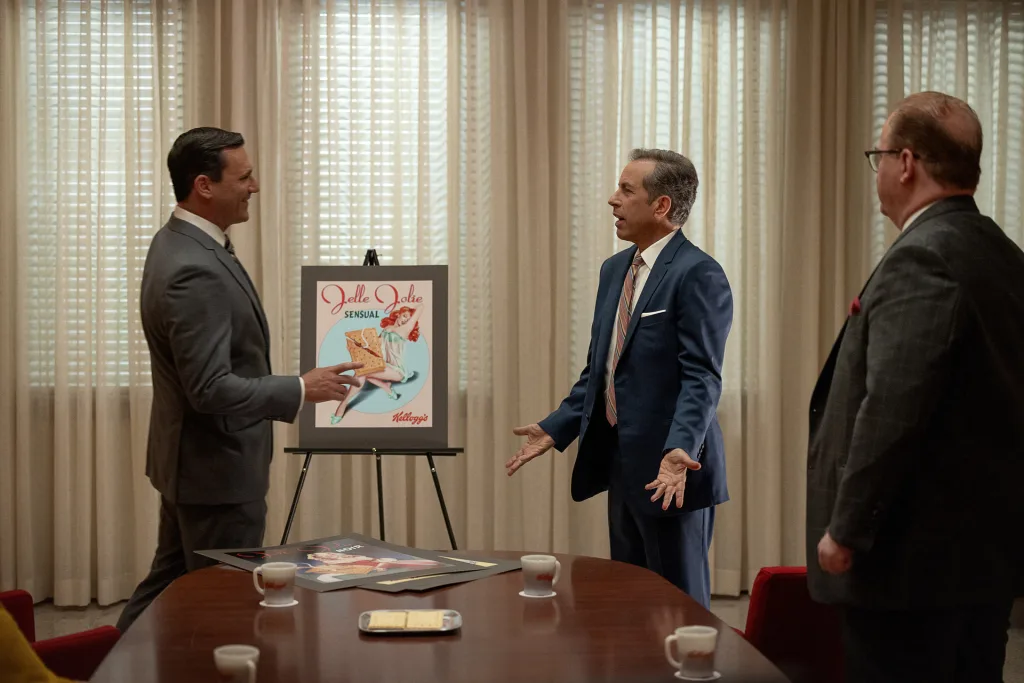
Seinfeld revives the Lewis-Tashlin style in a vacuum—he and his cinematographer, William Pope, who shot the Matrix movies, defrost it like a TV dinner. As with that kind of food substitute, the film has a certain contempt for its concept and isn’t trying very hard. Most of the jokes are as flat as turkey slices and the whole thing presupposes how predictable it will be.
We are supposed to know the product being created is silly and sugary—bad for you, but in a benign way, just a fad. In 21st-century moviemaking, however, the depiction of product development and branding has moved on from this kind of zany, joke-a-second comedy to something more reverent and worshipful. It’s a new kind of business nostalgia, alien to companies with cartoon animal mascots like Tony the Tiger.
Unfrosted comes after a cycle of movies suffused with a deep love of capitalism, ones that look to the business world as a source of near-religious inspiration and worldly success. The Founder, in 2016, with Michael Keaton as Ray Kroc franchising McDonald’s fast-food restaurants, was the prototype for these. The current cycle, by my count, includes five films, all from 2023: Ben Affleck’s Air, about Nike’s creation of the Air Jordan sneaker; BlackBerry, a rueful look at Research in Motion’s development of their eponymous proto-smartphone; Tetris, a comedy-thriller on video-game licensing set in the Soviet Union as it’s collapsing; The Beanie Bubble, Kristin Gore’s cringey assessment of Ty’s line of plush collectible stuffed animals; and Flamin’ Hot, Eva Longoria’s story of how a janitor at a Fritos factory came up with the idea that PepsiCo should market snack chips to Latinos by coating them in tongue-burning red dust.
These movies are defined by how self-importantly they treat their subjects, and how they show the desperation of the characters developing their products. All anyone wants in any of these films is riches and success, and not just any kind of success. The goal is the mega-riches, hundreds of millions of dollars in passive income. Unfrosted, on the other hand, treats all this as a joke, which is strange because it was not made in response to the other films but alongside them. The film is an uncomfortable outlier in its genre.
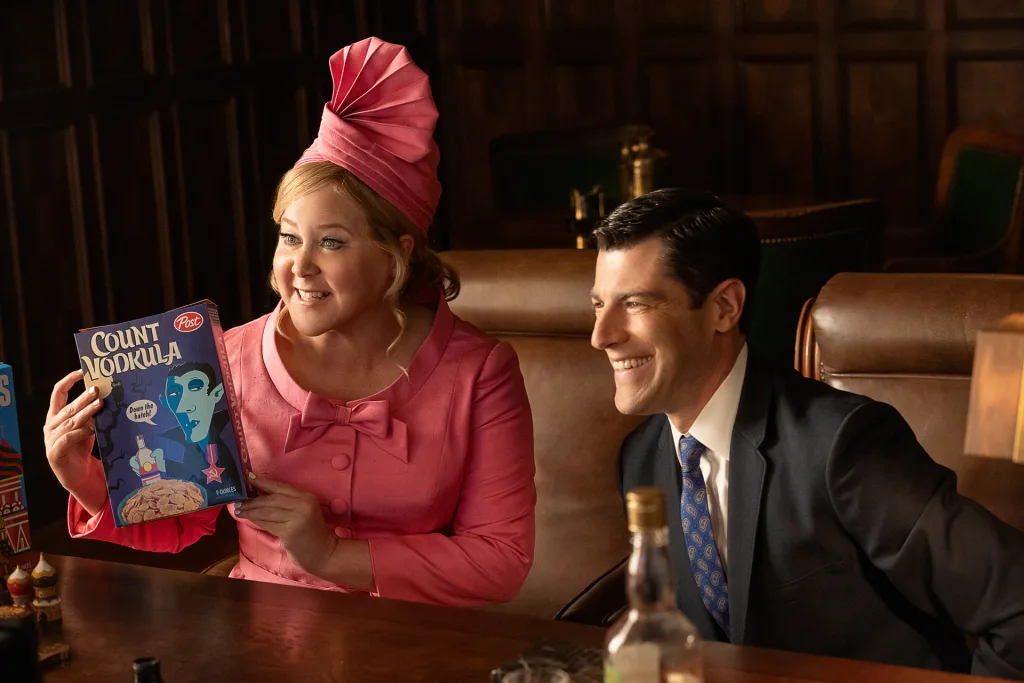
It’s Seinfeld’s status as a dilettante director—he’s said he doesn’t want to make another film—that allows his throwback movie to provide a kind of meta-commentary on the other ones in its genre. And what adds to that is how he has become a current cultural annoyance, a humble-bragger popping in on Saturday Night Live, an aging man who goes out of his way to insult college students while giving backhanded compliments to his film crew for working too hard when he is so wealthy he doesn’t have to work at all.
Seinfeld has said he wanted to make his film the opposite of Barbie, the biggest authorized product movie ever made. So besides being a film about nothing, the same why Seinfeld was a sitcom about nothing, with “no hugging, no learning,” what is Unfrosted?
It’s a movie that perfunctorily and even brutally catalogues and dismisses everything that was supposed to be good and true in movies like Air. It does what none of those movies could do in this time of precarity and gig work: It identifies clichés, using them to mock and dismiss the idea that any of this is worth anyone’s time, including watching this movie. Product creation and marketing in Unfrosted are just an elaborate ruse masking the real work being done, which is, as Seinfeld’s executive character says to his colleague in R&D (played by Melissa McCarthy), “jamming goo into tubes,” coming up with a name for it, shipping it and selling it.
In contrast, how could so many clichés be packed into such a small group of films in just one year, all of which say the opposite of Unfrosted? Made separately by different producers for different studios, Air, et al., each cover the same ground the same way. Whether they end in success or failure, whether they have a satirical element or are earnest and sincere, they are all “hugging and learning” movies instructing viewers about how to succeed in business while trying very hard indeed.
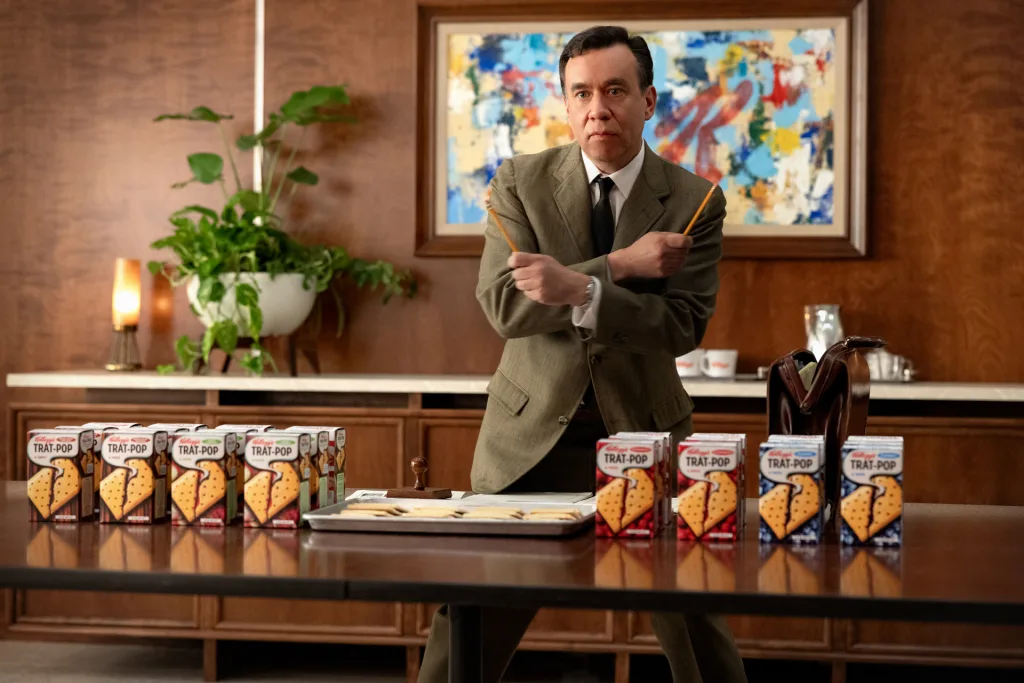
Each of the five films cycles through the same kind of 1980s montages featuring MTV and the “Big Brother” Apple commercial, Ronald Reagan and the fall of the Berlin Wall. Songs by the Violent Femmes crop up in more than one of them, amid generous helpings of other better-known pop hits. Houses must be mortgaged in these movies, presentations fumbled to better speak from the heart without notes. Janitor carts roll through all-night work sessions, phones get smashed in anger, and little children, the wisest of all, finally offer that eureka! moment of profound insight that unlocks the whole damn thing. Stats about market share and licensing income appear on screen at the end, telling us how many hundreds of millions Michael Jordan makes every year from the use of his name and image or that the Fritos janitor is now the director of marketing, how Blackberry and Beanie Babies once commanded enormous percentages of their markets but now have zero.
Tetris is the best example, presenting the licensing of a video game as a subject of world historical significance. International forces in Japan, the Soviet Union, and the U.K. are aligned against Henk Rodgers (Taron Egerton), who immediately sees Tetris’s potential in America when he discovers the game in 1988 at a booth at an electronics convention in Las Vegas.
Rescuing its creator from Russia as the country collapses and freeing Tetris to be sold overseas becomes a metaphor for the Cold War and American success. Tetris is a movie of Heroic Capitalism—as a Russian character says in it, “Have you ever tried to say no to an American? It’s impossible.” Once we hear that, we know the entire Soviet system in doomed. Similarly, in Unfrosted, the old milk-and-cereal regime and its frowsy uniformed cock-a-doodle-do mascots have no chance in the face of Pop-Tarts inexorable success.
When the cereal mascots go on strike and attack Kellogg’s headquarters, Seinfeld plays it as a parody of the invasion of the Capitol on January 6, 2021. The difference is that Tetris is ideologically, emotionally, and financially invested in that idea of regime change. For Seinfeld, it’s just a funny illustration of futility in the face of breakfast’s progress. He positions the mascots as labor only to also say yeah, but labor in silly costumes.
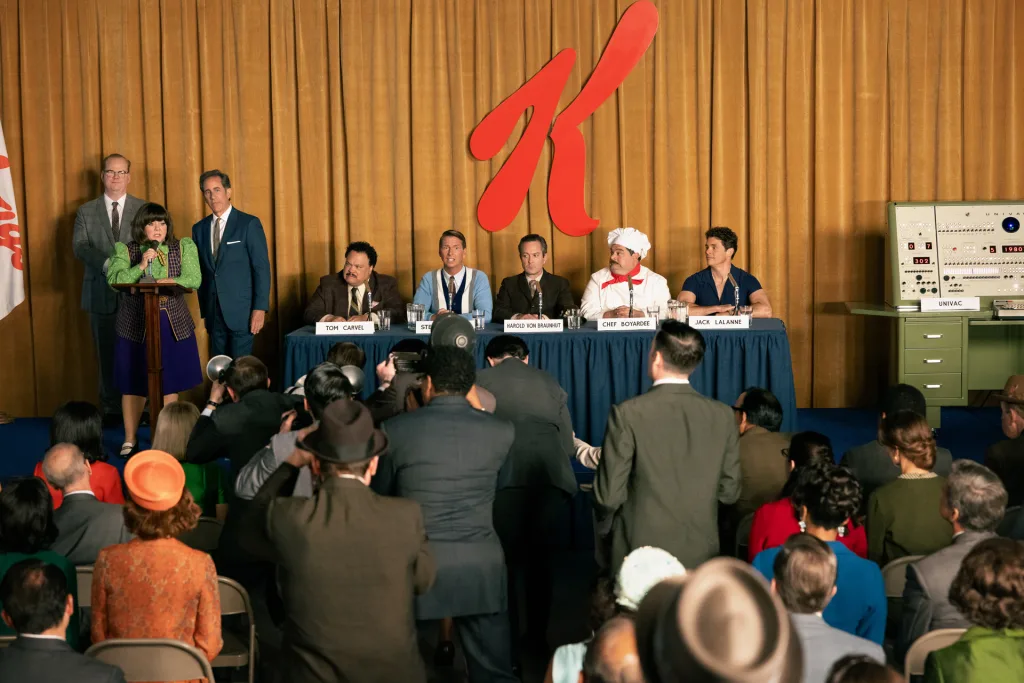
In one film, the triumph of capitalism depicted as grand and moving. In the other, it’s barely worth bringing up. The bigger picture is that, like Tetris, Unfrosted is a movie about marketing a product that’s addictive, especially to children, but that Unfrosted is very clear on that and these other films are not. In those, getting the kiddies hooked is subtext. Henk plays Tetris for five minutes, then sees falling blocks in his dreams. Right away, he just knows, the same way Ray Kroc just knew.
Similarly, Air Jordan sneakers and Beanie Babies, products aimed at youngsters, become obsessional objects consumers will buy in multiples, including consumers outside the original demographic. The BlackBerry becomes known as the Crackberry, and Flamin’ Hot Cheetos are initially marketed by the film’s janitor protagonist the same way drug dealers sell their wares in his neighborhood.
Pop-Tarts, of course, were explicitly made to appeal to children who wanted sugar for breakfast in a form they’d love because it was even easier to eat than a bowl of cereal. The movie portrays its first consumers, a pair of grubby tykes, as garbage pail kids so addicted to “the goo” (Pop-Tarts’ fruit filling) that they will dumpster-dive to get it. This kind of open admission is what sets Unfrosted apart from the other films here—Seinfeld is saying here in this dumpster you will find your hopes and ideals.
Open business-world cynicism of that variety points up a hidden aspect of the product movies. The films are sold as nostalgic, but is anyone actually nostalgic for any of these things, or for the shameful addictions they engendered? If you lost money investing in Beanie Babies, or if you were inordinately sad when the Blackberry disappeared, these are probably not feelings you want to revisit. In this uniquely unbearable moment in pop culture, in which Hollywood doesn’t know what stories to tell because everything has been degraded by an addiction to the exploitation of intellectual property, turning to the drama of product naming and sales success is comforting most of all to studio executives. Oppenheimer, it should be noted, was the story of a product launch, too. It showed a group of men taking a risk on the biggest bomb in history.
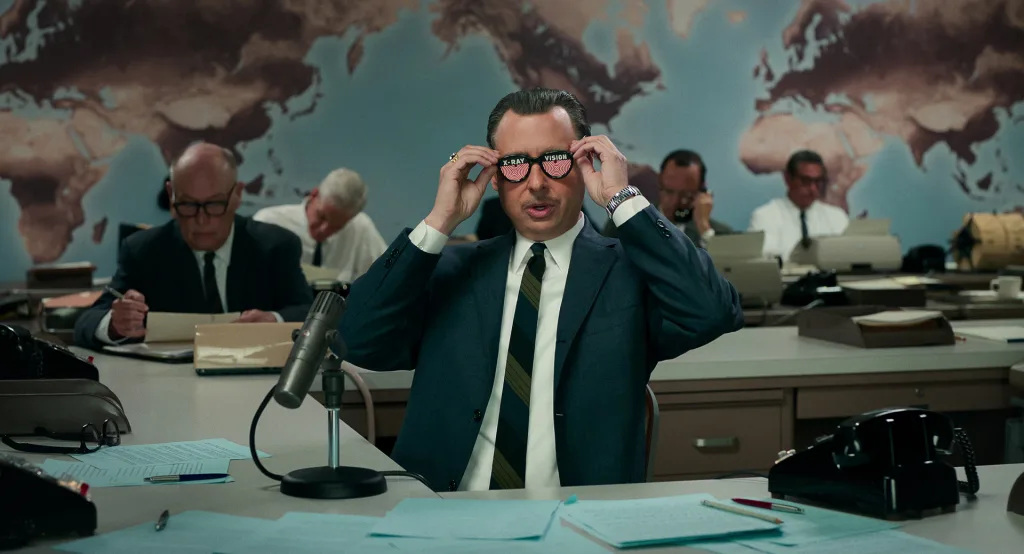
The nostalgia factor is an optical illusion. It’s not atomic destruction we are nostalgic for, nor addicting children to face-smearing goo, finger-coating dust, or Gameboys. It is massive success through licensing and franchising we love and want in on. The bourgeois-to-billionaire class that Jerry Seinfeld is part of doesn’t even go to movies anymore, as he pointed out. To understand why these movies are made we must study the executives who greenlit them, because public taste is no longer reflected in the mass production of culture at this level. How did we get the masses to eat Pop-Tarts? Now there’s a story. And in the case of Unfrosted, one that is not lying about being futzed with, rewritten, fudged, and made up.
In his recent book Foreverism, University of Georgia nostalgia scholar Grafton Tanner writes that movie studios have a different view of the past. The real strategy there, Tanner theorizes, is “to keep the past present so we aren’t nostalgic for it anymore.” “Nostalgia,” he writes, “is experienced when one fondly aches for the past. Foreverism, on the other hand, will implore you to revive the past and save it from ever dying again,” in order to maintain the current system of production in a way that disallows actual longing for anything better.
This being America, product development and naming has also become a religion that keeps the system in place. In Blackberry we are reminded that it was “the Jesus phone,” as the cult-object iPhone was nicknamed, that killed the handheld digital email assistant with the fruit-filled name. In Unfrosted, Seinfeld’s character makes fun of the Quaker Oats guy behind his back for being both CEO and mascot in his black priestly garb. “Mixing religion and cereal. Why?” Seinfeld asks. By the end of the film, when Pop-Tarts is a success, he has seen the light. “These things are the greatest two rectangles since the Ten Commandments!” he shouts.
In The Founder, McDonald’s CEO Ray Kroc’s mantra was “crosses, flags, arches; flags, crosses, arches.” He understood the fast food giant’s golden arches were a new kind of business monolith that could stand on equal ground next to Church and State. In a stellar coincidence that may just be a frugal licensing consideration, Unfrosted brings things full circle by ending with the same song The Founder did: one-hit wonder Norman Greenbaum’s “Spirit in the Sky,” from 1969, an evocation of sinlessness, eternal life, and friendship with Jesus. Unsurprisingly, the song has also been used in TV commercials for Nike and for Kellogg’s itself. “Spirit in the Sky” is a source of irony in The Founder. Kroc has cheated his way to the top and ruined several lives along the way. In Unfrosted, it’s just another obvious joke rolling off the production line.
(9)

